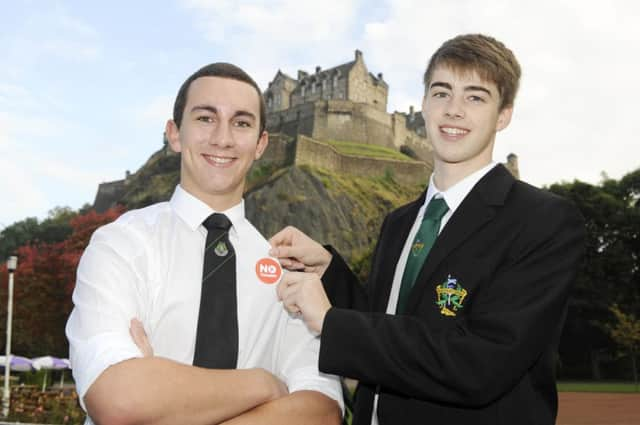Votes for 16-year-olds will be fast-tracked by SNP


The First Minister said new legislation will be enacted at the Scottish Parliament “as soon as possible” after a deal was struck between the UK and Scottish Governments to devolve the power over the franchise.
But 16- and 17-year-olds will not be allowed to vote in May’s UK general election.
Advertisement
Hide AdAdvertisement
Hide AdMiss Sturgeon said: “I am delighted that there is now cross-party support in the Scottish Parliament for extending the franchise.
“I stressed the need for rapid action on this front when I met David Cameron in London before Christmas – and I am delighted we now have a deal.”
She added: “We now intend to bring forward legislation to the Scottish Parliament as soon as possible.”
The decision should mean that 16- and 17-year-olds will be allowed to vote in next year’s Scottish Parliament elections. The decision to extend the franchise in the referendum was widely seen as a success.
CONNECT WITH THE SCOTSMAN
• Subscribe to our daily newsletter (requires registration) and get the latest news, sport and business headlines delivered to your inbox every morning
Scottish Secretary Alistair Carmichael added: “I’m delighted to confirm a timetable has been agreed for 16- and 17-year- olds to vote in future Scottish Parliament elections.
“I’ve always been a firm believer in votes at 16 – with the sheer number of young people participating and voting in last year’s referendum, I believe the case has become undeniable.”
The Section 30 order is the first stage in implementing the Smith Commission’s plans for greater devolution after the referendum No vote.
Advertisement
Hide AdAdvertisement
Hide AdThe commission, headed by Lord Smith and including representatives from all the main political parties, signed up to a deal which will see powers over income tax bands and some welfare handed to Holyrood, as well as devolution of other areas such as air passenger duty.
The UK Government will publish draft legislation on the Smith agreement later this week, ahead of the 25 January deadline. Scottish Liberal Democrat leader Willie Rennie yesterday urged the SNP government to abandon its “Holyrood knows best” approach and hand new powers to local communities under the commission plans.
The deal states that this should mean the “transfer of powers from Holyrood to local communities” and the Lib Dem leader said that council tax and business rates, paid locally, should no longer be “centralised” in Edinburgh.
Mr Rennie said: “The Scottish Government must commit to a twinned track approach to decentralisation.
“For that commitment to be credible with communities across Scotland, Nicola Sturgeon must make that guarantee this week.
“Failure to transfer powers across Scotland at the same time as they are being transferred to Scotland will be a profound breach of the Smith agreement.”
Deputy First Minister John Swinney called for all parties to listen to what civic Scotland had to say on the draft legislation.
He argued: “The publication of these proposals creates the opportunity for people and organisations across Scotland to have the opportunity to shine a light on what is being offered.”
SCOTSMAN TABLET AND IPHONE APPS